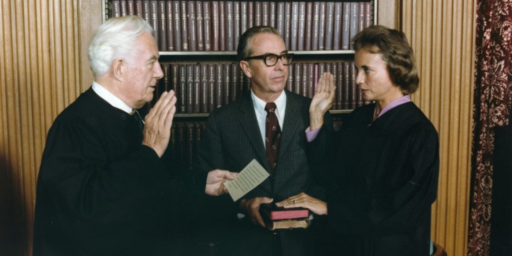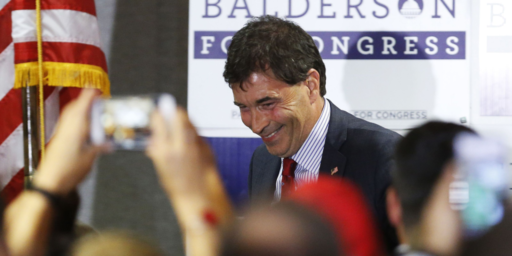1ST AMENDMENT ROUNDUP
Spoons has an excellent post on the ramifications of yesterday’s decision, including a redacted version of the Bill of Rights.* He also links a large roundup on the Southern California Law Blog.
WSJ’s John Fund thinks the opinion establishes swing voter Sandra Day O’Connor as a “full-fledged judicial activist.”
Justice Sandra Day O’Connor more or less completed her ideological journey toward judicial activism yesterday when she cast the deciding vote upholding the McCain-Feingold restrictions on campaign speech. Proponents of judicial restraint who were leery of her when Ronald Reagn appointed her in 1981 acknowledge that even they didn’t expect her to come under the sway of elite opinion as much as she has.
The court’s decision in McConnell v. Federal Election Commission is a body blow to the protection of political speech, which the Founding Fathers thought so important that they wrote the First Amendment explicitly to make clear that Congress “shall make no law . . . abridging the freedom of speech.” You wouldn’t think they could be more clear. But by a 5-4 majority the Supreme Court upheld McCain-Feingold’s restrictions on “electioneering communications,” or ads that run close to an election and mention a particular candidate. It also gave a green light to a ban on the raising and spending of “soft money,” funds contributed to the major parties in excess of the limits on contributions that to individual candidates.
In a stinging dissent, Justice Antonin Scalia noted the dangers inherent in the court’s decision: “The first instinct of power is the retention of power, and, under a Constitution that requires periodic elections, that is best achieved by the suppression of election-time speech. We have witnessed merely the second scene of Act I of what promises to be a lengthy tragedy.”
Another tragedy is the extent to which Justice O’Connor now routinely provides the necessary fifth vote to advance an agenda viewed favorably by judicial activists. Over a decade ago she joined with David Souter and Anthony Kennedy, two other Republican appointees, to uphold the constitutionality of that Magna Carta of judicial activism: Roe v. Wade.
While I agree with Fund generally, I’m not sure we can call this particular opinion “judicial activism.” Usually, we use that term to describe judges striking down the will of the people in favor of their own view of the law, regardless of the Constitution. In this case, her vote upheld an act of the legislature. This is actually an example judicial timidity: She stood by and allowed the Constitution to be trampled upon for rather dubious political reasons (the need to prevent the appearance of corruption as sufficient to trump the most fundamental of political liberties).
CATO’s John Samples, writing in USA Today, observes,
Before this decision, Congress only could regulate the financing of ads that expressly advocated the election or defeat of a candidate. Now Congress has a green light to regulate the funding of any and all ads on political issues during an election.
The court’s decision confirms Thomas Jefferson’s view that “the natural progress of things is for liberty to yield and government to gain ground.” The court gave Congress more power and job security. The rest of us have less political liberty and a less-accountable government.
*One of Spoons’ commenters wanted more explanation for the redaction. There are several annotated Constitutions available online. FindLaw has the best free one I’ve seen, although it is a bit detailed for those only casually interested. A good down-and-dirty one is here. It is indeed amazing to see how many judicial “amendments” have been made to the Constitution.





I suppose “judicial inactivism” might be a more apt description. But the idea is the same: judges consitutionalizing their own political preferences in defiance of what the Constitution actually says.